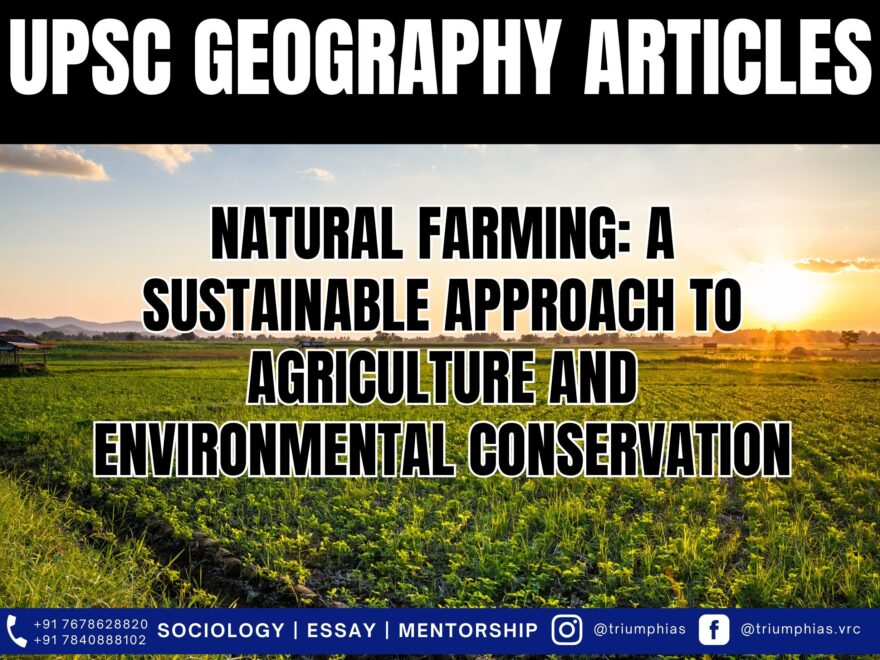Natural Farming
(Relevant for Geography Section of General Studies Paper Prelims/Mains)

Natural Farming
Natural Farming is both an art and a practice, and it’s progressively becoming a scientific endeavor focused on harmonizing with nature to attain higher outcomes with fewer resources. Nonetheless, this approach has often been linked to reduced crop yields and limited improvements in farmers’ incomes.
This agricultural approach was introduced by Masanobu Fukuoka, a Japanese farmer and philosopher, in his 1975 book ‘The One-Straw Revolution.’
It represents a diverse farming system that integrates crops, trees, and livestock, facilitating the optimal utilization of functional biodiversity.
Globally, Natural Farming is recognized as a type of regenerative agriculture, a prominent strategy for environmental conservation.
It offers the potential to not only increase farmers’ income but also contribute to soil fertility restoration, environmental well-being, and the mitigation or reduction of greenhouse gas emissions.
This approach has the capability to effectively manage land practices and sequester carbon from the atmosphere into soils and plants, where it can be highly beneficial.
Several initiatives have been launched in this context:
- Paramparagat Krishi Vikas Yojana (PKVY)
- Sub-mission on AgroForestry (SMAF)
- National Mission on Sustainable Agriculture (NMSA)
- Rashtriya Krishi Vikas Yoj
Measures that can be taken to scale up Natural Farming
- Expanding Beyond the Ganga Basin: The focus should extend to the promotion of natural farming in rainfed regions beyond the Gangetic basin.
- Rainfed areas utilize only one-third of the fertilizers per hectare compared to irrigated regions, making the transition to chemical-free farming more feasible.
- Moreover, farmers in these regions can benefit significantly as current crop yields are comparatively low.
- Mitigating Risks for a Smooth Transition: To facilitate a seamless shift to chemical-free farming, farmers transitioning should be automatically enrolled in the government’s crop insurance scheme, PM Fasal Bima Yojana (PMFBY).
- Any change in agricultural practices, such as crop diversification or altered farming methods, introduces additional risks for farmers. Addressing these risks could encourage more farmers to embrace the transition.
- Supporting Agricultural Micro, Small, and Medium Enterprises (Agri MSMEs): The government should extend support to microenterprises that produce inputs for chemical-free agriculture.
- To tackle the challenge of the limited availability of natural inputs, the promotion of natural farming should go hand in hand with the establishment of village-level input preparation and sales shops. With two such shops in every village nationwide, it could provide livelihood opportunities for at least five million youth and women.
- Inspiration from Fellow Farmers: NGOs and exemplary farmers who have championed sustainable agriculture practices across the country can serve as inspirational figures.
- According to research by CEEW (Council on Energy, Environment, and Water), approximately five million farmers are already engaged in some form of sustainable agriculture, with numerous NGOs actively promoting these practices.
- Learning from peers, especially exemplary farmers, through on-field demonstrations has proven highly effective in scaling up chemical-free agriculture in Andhra Pradesh.
- Leveraging Community-Based Institutions: Community institutions can play a pivotal role in raising awareness, inspiring others, and providing social support.
- The government should foster an environment where farmers can learn from and support each other during the transition.
- Beyond revising the curriculum in agricultural universities, there is a pressing need to enhance the skills of agricultural extension workers in sustainable farming practices.
Sample Question for UPSC Sociology Optional Paper:
Question 1:
What is the sociocultural impact of transitioning from conventional to Natural Farming?
Short Answer:
The transition from conventional to Natural Farming can have a profound sociocultural impact by reinforcing traditional agricultural wisdom and community bonds, leading to a more sustainable and ecologically conscious society.
Question 2:
How does Natural Farming intersect with the concept of social capital?
Short Answer:
Natural Farming often involves community cooperation and shared knowledge, thereby enriching social capital by fostering community ties, trust, and mutual assistance.
Question 3:
What role do NGOs play in the promotion and scaling of Natural Farming in India?
Short Answer:
NGOs play a critical role in awareness-raising, training, and providing resources for Natural Farming, thereby serving as catalysts for its adoption and scalability.
Question 4:
Discuss the gender dimensions of Natural Farming.
Short Answer:
Natural Farming can empower women by involving them in decision-making processes and offering them opportunities in agricultural microenterprises, thereby improving gender equality in the sector.
Question 5:
How does Natural Farming contribute to rural development?
Short Answer:
Natural Farming can spur rural development by increasing farmers’ incomes, improving food security, restoring soil health, and generating employment opportunities, especially through Agri MSMEs.
 |
 |
To master these intricacies and fare well in the Sociology Optional Syllabus, aspiring sociologists might benefit from guidance by the Best Sociology Optional Teacher and participation in the Best Sociology Optional Coaching. These avenues provide comprehensive assistance, ensuring a solid understanding of sociology’s diverse methodologies and techniques.
Natural Farming, Sustainable Agriculture, Masanobu Fukuoka, Regenerative Agriculture, Paramparagat Krishi Vikas Yojana, Sub-mission on AgroForestry, National Mission on Sustainable Agriculture, Rashtriya Krishi Vikas Yoj, Soil Fertility, Greenhouse Gas Emissions, Rainfed Regions, Chemical-Free Farming, Agri MSMEs

Choose The Best Sociology Optional Teacher for IAS Preparation?
At the beginning of the journey for Civil Services Examination preparation, many students face a pivotal decision – selecting their optional subject. Questions such as “which optional subject is the best?” and “which optional subject is the most scoring?” frequently come to mind. Choosing the right optional subject, like choosing the best sociology optional teacher, is a subjective yet vital step that requires a thoughtful decision based on facts. A misstep in this crucial decision can indeed prove disastrous.
Ever since the exam pattern was revamped in 2013, the UPSC has eliminated the need for a second optional subject. Now, candidates have to choose only one optional subject for the UPSC Mains, which has two papers of 250 marks each. One of the compelling choices for many has been the sociology optional. However, it’s strongly advised to decide on your optional subject for mains well ahead of time to get sufficient time to complete the syllabus. After all, most students score similarly in General Studies Papers; it’s the score in the optional subject & essay that contributes significantly to the final selection.
“A sound strategy does not rely solely on the popular
Opinion of toppers or famous YouTubers cum teachers.”
It requires understanding one’s ability, interest, and the relevance of the subject, not just for the exam but also for life in general. Hence, when selecting the best sociology teacher, one must consider the usefulness of sociology optional coaching in General Studies, Essay, and Personality Test.
The choice of the optional subject should be based on objective criteria, such as the nature, scope, and size of the syllabus, uniformity and stability in the question pattern, relevance of the syllabic content in daily life in society, and the availability of study material and guidance. For example, choosing the best sociology optional coaching can ensure access to top-quality study materials and experienced teachers. Always remember, the approach of the UPSC optional subject differs from your academic studies of subjects. Therefore, before settling for sociology optional, you need to analyze the syllabus, previous years’ pattern, subject requirements (be it ideal, visionary, numerical, conceptual theoretical), and your comfort level with the subject.
This decision marks a critical point in your UPSC – CSE journey, potentially determining your success in a career in IAS/Civil Services. Therefore, it’s crucial to choose wisely, whether it’s the optional subject or the best sociology optional teacher. Always base your decision on accurate facts, and never let your emotional biases guide your choices. After all, the search for the best sociology optional coaching is about finding the perfect fit for your unique academic needs and aspirations.
To master these intricacies and fare well in the Sociology Optional Syllabus, aspiring sociologists might benefit from guidance by the Best Sociology Optional Teacher and participation in the Best Sociology Optional Coaching. These avenues provide comprehensive assistance, ensuring a solid understanding of sociology’s diverse methodologies and techniques. Sociology, Social theory, Best Sociology Optional Teacher, Best Sociology Optional Coaching, Sociology Optional Syllabus.
Best Sociology Optional Teacher, Sociology Syllabus, Sociology Optional, Sociology Optional Coaching, Best Sociology Optional Coaching, Best Sociology Teacher, Sociology Course, Sociology Teacher, Sociology Foundation, Sociology Foundation Course, Sociology Optional UPSC, Sociology for IAS,
Follow us :
🔎 https://www.instagram.com/triumphias
🔎https://www.youtube.com/c/TriumphIAS
https://t.me/VikashRanjanSociology
Find More Blogs
|
Scope of the subject and comparison with other social sciences |
|||
|
|
|
|
Modernity and social changes in Europe |

